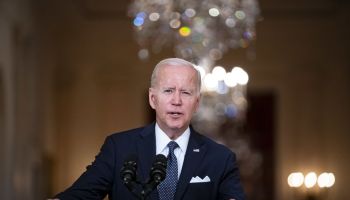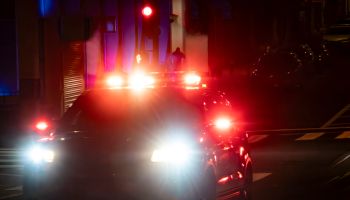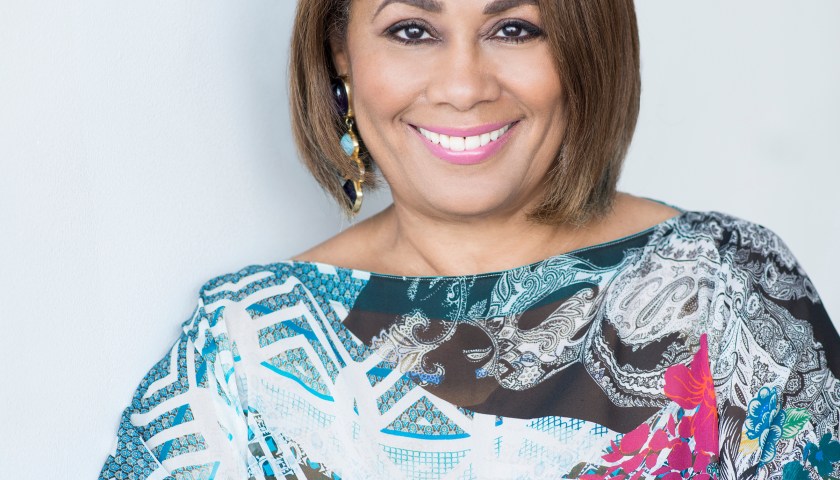Stan Donaldson, The Plain Dealer
EAST CLEVELAND, Ohio — Two dozen people crowded into a cramped office in the McCall Hotel on a hot Wednesday evening in August for the weekly meeting of Black on Black Crime Inc.
Art McKoy, the group’s co-founder and a lightning rod for controversy for 40 years, had turned on a few portable fans and kept the room dark before the group filed in. Someone flipped on the lights as people began to arrive, illuminating the signs and posters from protests and vigils pasted on the walls as homage to McKoy’s work.
On this evening, new people with new complaints have come to McKoy and Black on Black Crime for help. But before anyone airs a grievance, before any business can be discussed, McKoy — with a red, black and green cap holding back his long dreadlocks and matching bands on his wrists — asks if everyone is ready to sing “Oh Freedom.”
Oh, freedom, oh, freedom
Oh freedom over me
And before I’d be a slave
I’d be buried in my grave
And go home to my Lord and be free.
The 66-year-old Army vet, ex-con, entrepreneur and father doesn’t always keep the melody. But that doesn’t matter to him. The words to the old gospel hymn mean too much to let the way they sound get in the way.
“I don’t care about being off-key,” he told the group. “I care about making sure you understand these words.”
The words have deep, personal meeting for McKoy. He knows what it’s like to lose his freedom. He spent two years in prison for a crime he gained nothing from. And on more than one occasion, he has lived through the hell of having charges brought against him that prosecutors couldn’t make stick.
In July, a Cuyahoga County judge dismissed a case against McKoy after prosecutors refused to reveal the identity of an informant who said McKoy allowed drug dealing at his barbershop.
McKoy and his lawyers claim they were trumped up charges. They said McKoy’s four decades of fighting against the system have made him a target. Many times he has been called divisive and accused of injecting race into controversies when it doesn’t apply. He has made powerful enemies in police departments and city halls in Northeast Ohio.
He is contemplating a lawsuit over his latest brush with the law. He is insulted that he was accused of doing what he despises — conspiring to sell poison in his own community.
“Now why would I do that?” McKoy asked, banging his hand on a table during an interview. “I’m the one with the bullhorn who would chase the dope boys and dealers away, so why would I sell drugs?”
Oh, freedom, oh, freedom
Arthur Lewis McKoy’s beliefs on race and justice were shaped by his early years in the segregated south. He was born in 1944 in Garland, N.C. He came to Northeast Ohio when he was 13 after his mother, Sadie Bell Treadwell McKoy, died from cancer. His father, Norman McKoy, sent for him because the younger McKoy and his three older siblings couldn’t keep up with the family farm.
“My mother grew tobacco, corn and cotton all by herself,” McKoy said. “We tried to keep the farm by ourselves, but we didn’t do good.”
His father worked at a hospital here. It was a whole new world for McKoy. He had never seen snow. Never needed a thick winter coat. Never seen streets with tall buildings on every block.
“I cried all the way,” he said. “I didn’t really know my father, and he was a stranger to me. But our relationship improved as I got to know him.”
By the time McKoy was a teenager, he had become interested in being an entrepreneur. He graduated from East High School in 1962 and attended the former Erma Lee Beauty and Barber School. At the time, it was the only blacked-owned barber college in the city.
He opened New York Barbershop on East 105th Street and Superior Avenue and ran it until he was drafted into the Army in 1965 to fight in Vietnam. He realized while in combat overseas that there were battles he should be fighting back home.
“I was there fighting for my country, watching my comrades fall, seeing things I will never forget, then I hear this report about Dr. Martin Luther King Jr. in Selma and black people getting bit by dogs and people being hosed down,” he said. “I knew when I came back, I had to be involved.”
But he didn’t get involved when he came home. He drifted.
He returned to Cleveland and his barbershop in 1968. He turned to drugs to ease his anxiety from what he saw during the war. First marijuana, then various pills. Then, he found himself looting during the 1969 riots.
“For a period of time I lost my way and the goals I set for myself during the war had vanished,” he said.
McKoy said he battled with drug addiction for several years and eventually quit using on his own as he saw the conditions in his community deteriorate. In the early 1970s, the murder rate in Cleveland skyrocketed and businesses in black neighborhoods crumbled.
Oh freedom over me
In 1972, McKoy and a group of business owners set up Black on Black Crime Inc. to help stop violence within the black community. If they heard about conflicts, they intervened. Some of the businesses also hired a few of the troublemakers to help them turn their lives around.
By the late 1980s, the focus of the group had evolved. They became a place people turned to when tragedy struck. They began to work in suburbs and across racial lines. Whenever young people were killed or when people died after encounters with police, McKoy and his colleagues got involved.
Longtime Black on Black member Judy Martin met McKoy at one of her weakest moments — when her son was murdered in 1994. Martin, who is white, said while McKoy is known for the protests, vigils and fiery speeches, no one ever pays attention to the small things.
“When my son died he came over just to talk, and I watched him do that with so many other families aside from the vigils,” she said. “I’ve seen him reach into his own pocket to help people, and he always takes time to listen to everyone who has walked through the Black on Black Crime office.”
McKoy and the group took on police for failing to solve crimes, camped out to protest inner-city violence, battled RTA over poor station conditions and rallied at The Plain Dealer over a controversial cartoon.
On “Black on Black Crime with Art McKoy” — his weekly show on WTAM 1100 — McKoy regularly speaks his mind about violence, poverty and the lack of attention some government officials pay to the black community. It has been on the air for five years.
Story Compliments Of The Plain Dealer
















